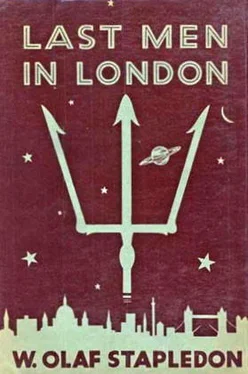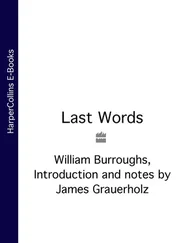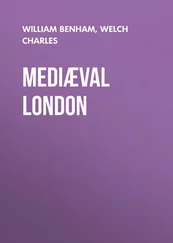After such experiences in the heart of the city, Paul, in the train for his southern suburb, would already change his mood. Even while the train crossed the river the alteration would come. He would note, perhaps, the sunset reflected in the water. Though so unfashionable, it was after all alluring. The barges and tugs, jewelled with port and starboard and mast-head lights, the vague and cliffy rank of buildings, the trailing smoke, all these the sunset dignified. Of course it was nothing but a flutter of ether waves and shifting atoms, glorified by sentimental associations. Yet it compelled attention and an irrational worship. Sometimes Paul withdrew himself from it into his evening paper, resentful of this insidious romanticism. Sometimes he yielded to it, excusing himself in the name of Whitehead.
If it was a night-time crossing, with the dim stars beyond the smoke and glow of London, Paul would experience that tremor of recognition, of unreasoning expectation, which through my influence the stars had ever given him, and now gave him again, tinctured with a new dread, a new solemnity.
And when at last he was at home, and, as was his custom, walking for a few minutes on the Down before going to bed, he would feel, if it were a jewelled night, the overwhelming presence of the Cosmos. It was on these occasions that I could most completely master him, and even lift him precariously to the Neptunian plane. First he would have a powerful apprehension of the earth’s rotundity, of the continents and oceans spreading beneath him and meeting under his feet. Then would I, using my best skill on the many keyboards of his brain, conjure in him a compelling perception of physical immensity, of the immensity first of the galactic universe, with its intermingling streams of stars, its gulfs of darkness; and then the huger immensity of the whole cosmos. With the eye of imagination he would perceive the scores, the millions, of other universes, drifting outwards in all directions like the fire-spray of a rocket. Then, fastening his attention once more on the stray atom earth, he would seem to see it forging through time, trailing its long wake of aeons, thrusting forward into its vaster, its more tempestuous future. I would let him glimpse that future. I would pour into the overflowing cup of his mind a torrent of visions. He would conceive and sensuously experience (as it were tropical rain descending on his bare head) the age-long but not everlasting downpour of human generations. Strange human-inhuman faces would glimmer before him and vanish. By a simple device I made these glimpsed beings intimate to him; for I permitted him ever and again to see in them something of Katherine, though mysteriously transposed. And in the strange aspirations, strange fears, strange modes of the spirit that would impose themselves upon his tortured but exultant mind I took care that he should feel the strange intimate remoteness that he knew in Katherine. With my best art I would sometimes thrash the strings of his mind to echoes of man’s last, most glorious achievement. And here again I would kindle this high theme with Katherine. Along with all this richness and splendour of human efflorescence I established in him an enduring emotional certainty that in the end is downfall and agony, then silence. This he had felt already as implicit in the nature of his own species, his own movement of the symphony; but now through my influence he knew with an absolute conviction that such must be the end also of all things human.
Often he would cry out against this fate, inwardly screaming like a child dropped from supporting arms. But little by little, as the months and years passed over him, he learned to accept this issue, to accept it at least in the deepest solitude of his own being, but not always to conduct himself in the world according to the final discipline of this acceptance.
At last there came a night when Paul, striding alone through the rough grass of the Down, facing the Pole Star and the far glow of London, wakened to a much clearer insight. One of Katherine’s children had recently been knocked over by a car and seriously hurt. Paul saw Katherine for a few moments after the accident. With shock he saw her, for she was changed. Her mouth had withered. Her eyes looked at him like the eyes of some animal drowning in a well. It was upon the evening of that day that Paul took this most memorable of all his walks upon the Down. I plied him, as so often before, with images of cosmical pain and grief, and over all of them he saw the changed face of Katherine. Suddenly the horror, the cruelty of existence burst upon him with a new and insupportable violence, so that he cried out, stumbled, and fell. It seemed to him in his agony of compassion that if only the pain of the world were his own pain it might become endurable; but it was the pain of others, and therefore he could never master it with that strange joy which he knew was sometimes his. If all pain could be made his own only, he could surely grasp it firmly and put it in its place in the exquisite pattern of things. Yet could he? He remembered that mostly he was a coward, that he could not endure pain even as well as others, that it undermined him, and left him abject. But sometimes he had indeed been able to accept its very painfulness with a strange, quiet joy.
He thought of a thing to do. He would have a careful look at this thing, pain. And so, sitting up in the grass, he took out his pocket-knife, opened the big blade, and forced the point through the palm of his left hand. Looking fixedly at the Pole Star, he twisted the blade about, while the warm blood spread over his hand and trickled on to the grass. With the first shock his body had leapt, and now it writhed. The muscles of his face twisted, he set his teeth lest he should scream. His forehead was wet and cold, and faintness surged over him; but still he looked at Polaris, and moved the knife.
Beneath the Star spread the glow of London, a pale glory over-arching the many lives. On his moist face, the wind. In his hand, grasped in the palm of his hand, the thing, pain. In his mind’s eye the face of Katherine, symbol of all compassion. And, surging through him, induced by my power in him, apprehensions of cosmical austerity.
Then it was that Paul experienced the illumination which was henceforth to rule his life. In a sudden blaze of insight he saw more deeply into his own nature and the world’s than had ever before been possible to him. While the vision lasted, he sat quietly on the grass staunching his wounded hand and contemplating in turn the many facets of his new experience. Lest he should afterwards fail to recapture what was now so exquisitely clear, he put his findings into words, which however seemed incapable of expressing more than the surrounding glow of his experience, leaving the bright central truth unspoken.
‘This pain in my hand’, he said, ‘is painful because of the interruption that has been caused in the harmonious living of my flesh. All pain is hateful in that it is an interruption, a discord, an infringement of some theme of living, whether lowly or exalted. This pain in my hand, which is an infringement of my body’s lowly living, is not, it so happens, an infringement also of my spirit. No. Entering into my spirit, this pain is a feature of beauty. My spirit? What do I really mean by that? There is first I, the minded body, or the embodied mind; and there is also my spirit. What is it? Surely it is no substantial thing. It is the music rather, which I, the instrument, may produce, and may also appreciate. My glory is, not to preserve myself, but to create upon the strings of myself the music that is spirit, in whatever degree of excellence I may; and to appreciate the music in myself and others, and in the massed splendours of the cosmos, with whatever insight I can muster. Formerly I was dismayed by the knowledge that pain’s evil was intrinsic to pain. But now I see clearly that though this is so, though pain’s evil to the pain-blinded creature is an absolute fact in the universe, yet the very evil itself may have a place in the music which spirit is. There is no music without the torture of the strings. Even the over-straining, the slow wearing out, the sudden shattering of instruments may be demanded for the full harmony of this dread music. Nay, more. In this high music of the spheres, even the heartless betrayals, the mean insufficiencies of will, common to all human instruments, unwittingly contribute by their very foulness to the intolerable, the inhuman, beauty of the music.’
Читать дальше












